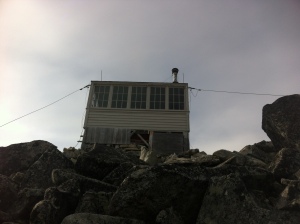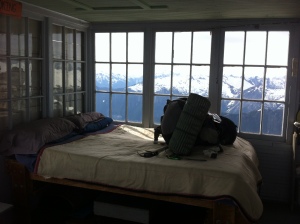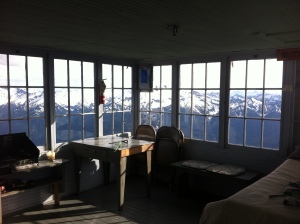I’m an avid backpacker. I particularly enjoy the meditative aspects of solo treks, particularly into the mountains, where the challenging geography provides more opportunities for solitude and exciting adventures, and the onslaught of adrenaline and riddance of distractions nurtures an ascetic self-awareness. Most every time I venture out onto the trail, or cross-country, I’m able to construct another piece of my relationship with myself and the world around me. My most recent expedition involved a one-night stay at the backcountry Hidden Lake fire lookout in Washington’s North Cascades, built in 1931 by the U.S. Forest Service and now a backcountry destination and first-come-first-served residence thanks to the Friends of the Hidden Lake Lookout. Needless to stay, the views were stunning from atop the 6,900′ peak, and well worth the steep snowfield climb where I learned to love my ice axe (especially when glissading down the slopes).
Much as I enjoy a primitive campsite, with the reminders of civilization contained within my backpack and tent, there is some comfort in backcountry cabins, beyond the obvious shelter amenities. Long have I fixated upon homes in isolated, scenic locales, such as those featured on one of my favorite websites, Cabin Porn. They provide the best of both worlds — the human and nonhuman seemingly fused together. Up at the lookout, I came to reflect on this further: the presence of something as simple as a 10′ x 10′ box seems to quell some degree of the even entirely welcome trepidation that comes with being separated from the familiar (other humans, technology, creature comforts, etc.). Not that I would’ve minded pitching my tent on a small rock slab, but how could a small piece of civilization bring such comfort? The backcountry cabin, yurt, or other domicile allows retention of a slice of civilized comfort, even if someone is miles away from other reminders of society. Such a combination of rustic repose and rugged peaks, with the sharp contrast of several hours of highway driving fresh in my mind, prompted me to contemplate the nature of our concept of “nature”…
Wilderness is not where we feel the most whole. Instead, it provides a ground for our figure, illuminating the contrasts between us and our geography, or us and what the obsessors of civilization would call nothingness. And in the wilderness, we may feel a nothingness amplified, not because there is a dearth of content ostensibly outside the realm of society, but because we become aware of a nothingness within us. As we escape the trappings of our fellow man — and machine — returning to some sort of primeval form, albeit equipped with nylon pants and waterproof maps, and a lonely primeval being at that, suddenly made aware of not only the world without us (more or less) but us without the world in which we spend our time most, and frames our consciousness: the highway, office hallways, and couches we call home and the people who make them both bearable and dreaded.


